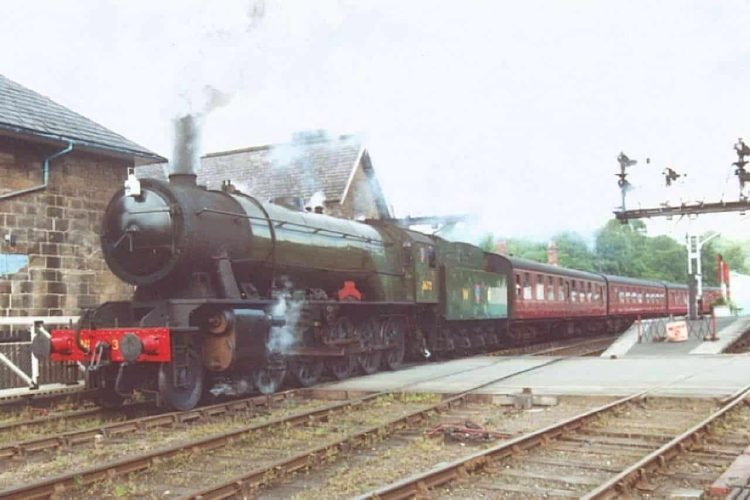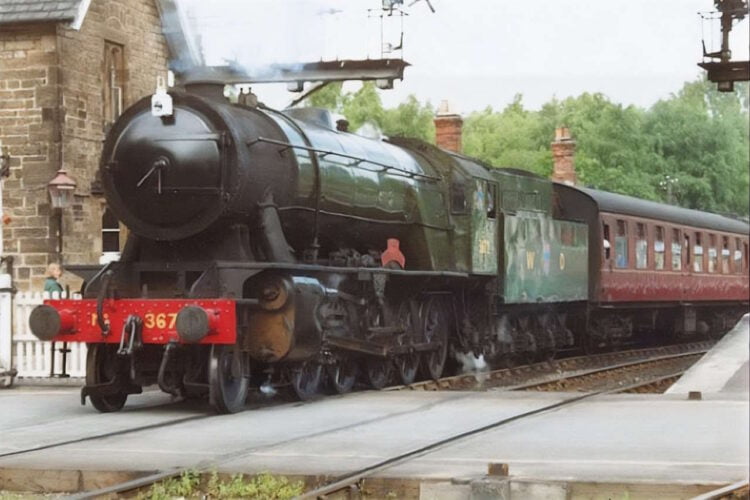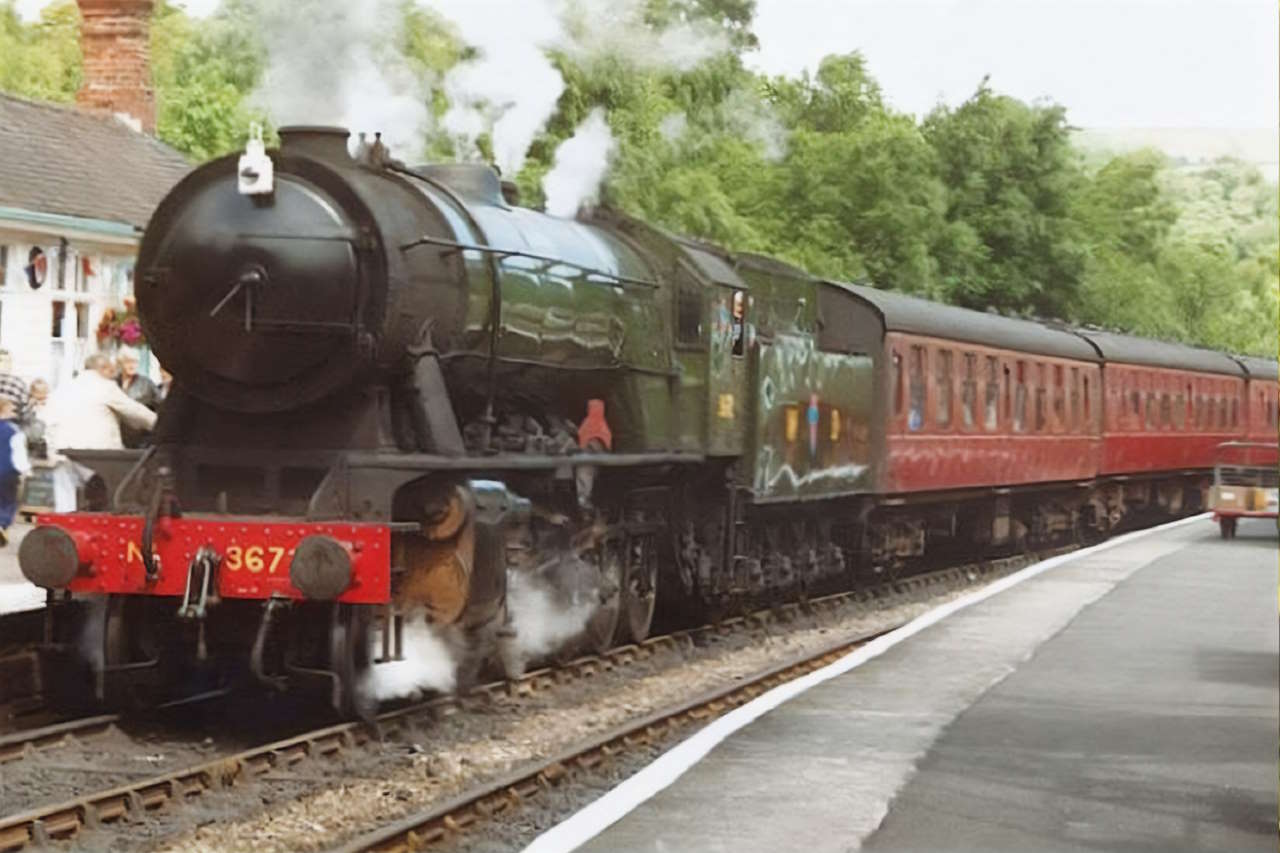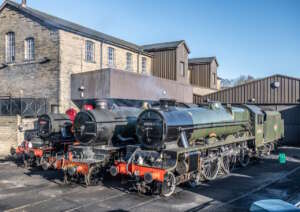The North Yorkshire Moors Railway (NYMR) announced last year that it is to convert former War Department 2-10-0 steam locomotive Dame Vera Lynn to run on oil instead of coal.
The railway has now confirmed that US-based railroad engineering and mechanical contractor FMW Solutions (FMW) will work with the North Yorkshire Moors Railway to carry out the conversion.

This change in fuel will be the first conversion of full-size steam locomotive oil conversion in the UK since the end of steam, which the North Yorkshire Moors Railway sees as securing its future as the busiest heritage railway in the country.
This will help ensure our steam locomotives remain in service for future generations.
Paul Middleton, Director of Mechanical Engineering at the NYMR
Built at the North British Locomotive Works in Glasgow in 1944 and numbered WD 3672, Dame Vera Lynn was one of 150 of these extremely powerful freight locomotives ordered for the war effort.
It was soon renumbered as WD 73672 and with 15 others of the same type of locomotives; it was shipped to Egypt, where it was put into storage.
These were declared surplus to requirements in October 1945 and sold to the Hellenic State Railways of Greece; in January 1946 they were shipped to Salonika in Greece.
By the 1970s, they were displaced by diesels, and Dame Vera Lynn was purchased for use on the Lavender Line in East Sussex, where it arrived in 1984.

It soon proved too large for that line, and in 1986 was bought by Clifford Brown who, he began to suffer ill health, decided that the locomotive should be placed in trust with the North Yorkshire Moors Railway where it arrived in December 1986.
Further information about the conversion can be found by clicking here.
Kelly Lynch, Davidson Ward, and Wolf Fengler from FMW Solutions together with Paul Middleton and Nick Simpson from the North Yorkshire Moors Railway have also recorded a video podcast ‘Restoration Roundtable’ that debates whether oil-fired steam is the way to go in future-proofing preservation. Watch the video podcast here.
This is a great opportunity to develop oil burning systems on our locomotives. This will help ensure our steam locomotives remain in service for future generations. Oil has many benefits, including lowering the risks of lineside fires, reducing staff hours maintaining locomotives and reducing business risk due to the unavailability of coal.
Paul Middleton, Director of Mechanical Engineering at the NYMR
We are thrilled to work alongside the NYMR Engineering Department at Grosmont to convert War Department (“WD”) 2-10-0 No. 3672 as part of its upcoming overhaul. This work will be a trans-Atlantic effort, with key firing components being manufactured both at our workshop in Tennessee and by the NYMR forces at Grosmont. The final installation is anticipated to take place on the NYMR.
Davidson Ward, President of FMW






Responses
If coal harder to source these days oil conversion is a no brainer especially if the oil burning system there talking about you can burn various oils like bio diesel maybe hvo oil recycled cooking oil I’m all for it if it preserves these engines
I cannot recall what actually happened but the GWR region of British Railways converted a number of County steam engines to Diesel in the 1950s, but had to re convert back to coal. Anyone else on here can enlighten me further ?
Let’s look at oil firing the Ffestiniog tried it for a good number of years and have now reverted to coal firing the reasons they did was to reduce fire risk in snowdonia national park but I believe cost of replacement fire boxes and the land maintainance of the railway reduced the fire risk the costs out weighed the huge costs of maintainance and varying costs of oil during 21st century
An insurmountable problem using hydrogen as a combustible fuel is that it limited to temperature peaks of 2400°C due to dissociation (of H2O) back into its components.
This would require the boiler to be substantially modified as they are designed for the higher temperatures associated with carbon combustion. Hydrogen is also a complete pain to store/use especially in a heritage railway scenario.
The north Yorks moors railway are a joke! They charge tourists/visitors the same price for a day ticket that locals are charged for an annual pass! As a visitor who likes trains I felt fleeced and won’t go on it.
Actually that’s wrong. Anyone, visitor or local, who buys an all-line ticket gets this automatically converted to an annual pass. People can still buy individual single tickets for a whole line single journey or one for travel between intermediate stations – these don’t convert to an annual pass but this applies to everyone, visitor or local.
I I am encouraged by the comments above !! The NYMR is strapped for cash due a lot of bad Managerial decisions . So why go to the States for oil firing ? The company in question use a very outdated system and very expensive for what it is !! There is a “British designed and developed system that is much cheaper and much simpler and cost effective , Oh and the NYMR snubbed the system for politics etc . This from a cash strapped railway !! Who ever the manager and CME are, the trust and share holders need to shake the tree so to speak and get rid the the dead bad apples otherwise I can assure you this is going to be a very expensive white elephant !!!! You have been warned !!!
Surely you should be converting to electricity or hydrogen? Using oil is also damaging to the environment and will be an expensive conversion that will not help climate change.
The effect on climate of a few steam engines running on either oil or coal is really negligible. Since Britain as a whole contributes less than 1% to the world’s carbon dioxide emissions, I really don’t think we need to be worrying about heritage railways having any effect on the climate.
Running on electricity (presumably using it to heat water to make the steam) would require enormous and expensive batteries and a substantial electricity grid connection to charge them. It is surely impracticable.
You could burn hydrogen to raise steam – but there’s a bit of a flaw – there is no available bulk supply of “green” hydrogen, and making hydrogen by electrolysing water uses far more energy than you get back when you burn the hydrogen, so where’s this energy coming from?
Heritage railways do have a lot of issues to worry about – but climate change is not one of them.
An insurmountable problem using hydrogen as a combustible fuel is that it limited to temperature peaks of 2400°C due to dissociation (of H2O) back into its components.
This would require the boiler to be substantially modified as they are designed for the higher temperatures associated with carbon combustion. Hydrogen is also a complete pain to store/use especially in a heritage railway scenario.
I’m delighted at this news to revive converting coal-fired steam to run on oil. This has, in fact, taken place on and off in the past.
As long ago as the 1890s, the Great Eastern Railway was building or retrofitting a number of it’s engines to run as oil burners, which had particularly advantages during a number of coal strikes during the early 20th century. Even more interesting is the fact that, initially, the oil fuel used was a waste product from the production of gas for lighting passenger coaches, so an early example of efficient recycling!
Converting some steam locos to burn oil was briefly done by the government following WWII, but abandoned once the bill for the imported oil arrived. So it’s encouraging that the scheme is now being reconsidered now in the 21st century. If pursued, it could well be a tried-and-tested means to both solve the coal supply crises, and keep steam alive in a greener world moving away from fossil fuels.
The original concept of allowing asome sort of railway over the North York Moors lines and as to give rambling and ( what we now call tourist) access to the North York Moors.
Given the lamentable financial performance of the NYMR , maybe it is time to put steam ” to bed” ( let’s face it younger people couldn’t care less about it.and they are the future), so perhaps the railway could attempt to be a ” community raillway”, allowing access to Moors.
Use diesel and try some environmentally forms of motive power for the future.
Conversion to Oil , means that the railway will be able to provide a Steam service in times of high fire risk. The damage done by stray sparks an coal embers to the Moors ecology is not worth thinking about
Sad to see coal firing being converted to oil but this is probably a sensible move by the NYMR, given the uncertainties over coal supply that the nonsensical Welsh assembly ordered closure of the last coal mine in Wales is causing.
Some coal used to be imported from Russia but that clearly is not now possible.
I suspect that other heritage railways may follow suit and, if it keeps steam in operation, it’ll be a worthwhile, though regrettable, change